Was The Revolution A Mistake?
Were the Colonists wrong to toss aside the British Empire so casually?
Conrad Black, a Canadian-born historian and member of the British House of Lords who has, admittedly, a rather checkered recent past, argues over at National Review that the colonists were wrong to overthrow the Crown:
It is verging on secular heresy to make the point, especially in the week of July 4, but the American colonists didn’t have much to complain about, either. The British pretension that the Mother of Parliaments could represent the Americans although they had no members of it was nonsense, especially as America had 30 percent of the population of Great Britain by the Revolution, and was the most prosperous British entity. But the taxes imposed were less than the British Isles were already paying; Britain gave the Americans a year to propose alternative sources of revenue; and all Britain was seeking was help in reducing the national debt, which had doubled during the Seven Years’ War (largely owing to the effort to throw the French out of Canada, at the insistence of the Americans). The original tea partiers, disguised as Indians, were overreacting to a tax that was confined to tea and was not excessive. Their current emulators are less colorful and imaginative.
The colonists had the better of the argument with the British, but individual Americans did not have substantively more liberties at the end of the Revolution than they had had at the beginning, nor more than the British in the home islands had (then or now or at any time in between), apart from having a resident sovereign government. The whole American notion of liberty came from the British, along with the common law and the English language. If the Americans had maintained their British status, they would control Britain and Canada and Australia and New Zealand now (another 120 million people and over $5 trillion of GDP), have all their energy needs met, and enjoy better government than they have actually endured for the past 20 years. It would have been much easier to abolish slavery and, if there had been a Civil War, it would not have lasted long, nor cost a fraction of the 750,000 American lives that it did. There would have been no World Wars or Cold War, or at least no conflict remotely as perilous as those were. The United States would also have less than its current 25 percent of the world’s incarcerated people, and wouldn’t have a legal cartel that devours 10 percent of its GDP. These are matters that, though they verge on secular heresy, Americans may want to consider, in between singing splendid anthems and rereading Jefferson’s defamation of poor old George III and his blood libel on the American Indian in the Declaration of Independence, this national holiday.
Black makes this argument in a longer piece that argues, quite forcefully, that colonialism, especially of the British variety, provided a better way of life for those over whom it ruled than the post-colonial world has brought. Judging from the wars that erupted in the immediate aftermath of the end of colonialism, especially on the Indian subcontinent, as well as the general corruption, deprivation of liberty, and poverty, that is commonplace in the former colonial areas of Africa, one must admit that Black has a point here. Of all the post-colonial nations, the ones that have seemed to have succeeded the most are those that were once part of the British Empire, such as India, but even there the transition was far from peaceful, and the eventual secession of Pakistan and Bangladesh was quite bloody indeed. Nonetheless, Black does have a point when he argues that self-government hasn’t exactly worked out for many of the former subjects of European colonial powers. In the end, though, it seems fairly clear that the end of Colonialism was inevitable, especially after the high costs of World Wars One and Two made it ever harder for Europe to maintain the dominance it once had.
As for his theory about what might have happened to the American Colonies in North America if Revolution had been avoided, it strikes me that he’s being a bit overly optimistic here. For one thing, if the colonies had not become an independent nation it seems unlikely that what we now call the United States would have been a Continental nation. It’s unlikely, for example, that Napoleon would have willingly turned over the French territories in North America to the British and, unless those territories had ended up being taken as booty after the end of the Napoleonic Wars, they would have been the home of either a French colony in North America or perhaps even an independent nation stretching from Louisiana to the Canadian border. Indeed, if the colonies had maintained their status as a British possession it’s entirely possible that the Napoleonic Wars would have resulted in fighting across the Atlantic so, in that sense, revolution may have saved the colonists and their descendants from a bloody repeat of the French & Indian Wars. Mexico likely would have claimed the territory in the southwest, along with most if not all of California and Nevada. To the extent the colonies advanced West it would have occurred in what is now Canada. With such a smaller size, Black’s projections about the economic output of the colonies seems to be a bit too high.
As for the rest of it, yes we might have avoided the Civil War and other such events, but the trouble with positing alternate history scenarios is that, even if you can state with some accuracy that Event X would not have happened, you have no idea what other avenues history might have taken. Imagine World War One fought on the North American continent, for example. Black assumes that history would have unfolded roughly the same, but that’s most certainly not the case.
There is one thing that Black’s argument does remind one of, though, and that is how easily the British might have been able to avoid the loss of their North American colonies if only King George and his advisers. In the beginning, the colonists major demands centered almost exclusively around greater representation in Parliament, and greater control over their own affairs. Had Britain relented on some of these demands, they quite likely would have taken much of the wind out of the sails of the nascent movement for independence because, as any good student of history knows, the American Revolution was more about political independence and self-government than it was about “liberty” in and of itself. Indeed, it wasn’t until the drafting of the Bill of Rights in 1789 that many of the complaints that had been lodged against the British as deprivations of liberty were actually addressed in American law. Of course, even if that had occurred, it’s quite probable that it would have only delayed the political break between England the colonies and that the inevitable desires for independence that distance from the homeland created would have come to the surface again.
The one thing that Black’s article doesn’t examine is how history would have been different without an independent United States of America. The ways in which the U.S. has influenced the course of world history, sometimes for ill but quite often for good, are quite innumerable, and one has to wonder how the world would have turned out without us around in a political, economic, and cultural sense. Since Black is obviously an Anglophile, and a British Peer to boot, perhaps he thinks we Americans haven’t added anything positive to the world that the Brits wouldn’t have been able to take care of on their own. He’d be wrong to think so, though, because I think it’s rather self-evidence that, on the whole, the United States has shaped the world in a positive manner over the past 236 years.
It’s always fun to play “What if” games with history, and Black’s example does bring up an interesting scenario to play around with. However, while I agree that history would have been different, but I doubt he’s correct that it would have been better. So, in the end, I’m just fine with the idea that we sent King George and his Redcoats packing and decided to figure things out on our own.
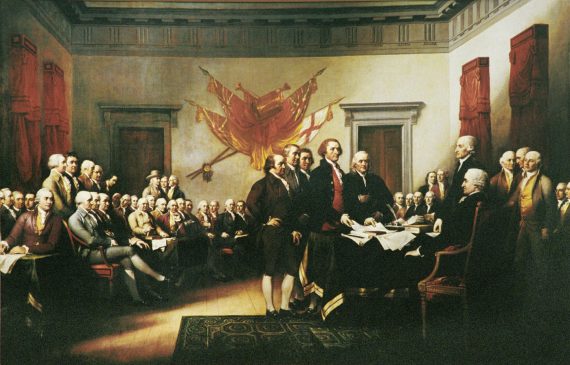

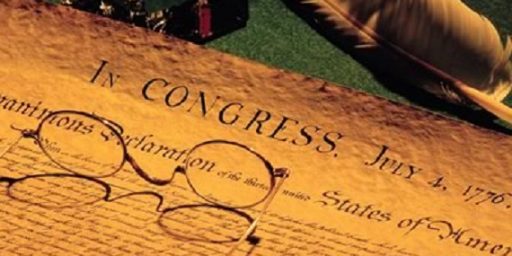
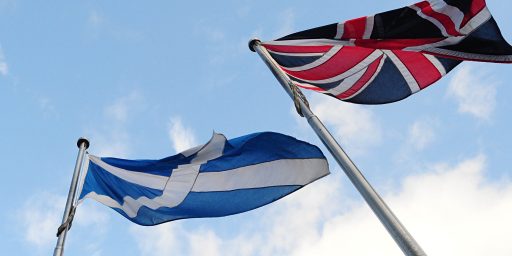
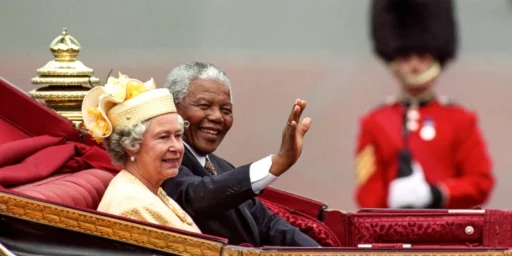

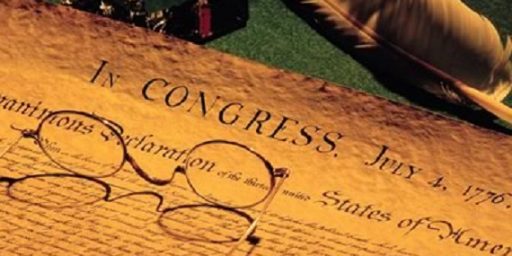
If the Crown was wise, they would have moved the Palace to Chicago.
Baring that, everything else was inevitable.
Considering the Crown at the time was held by a family of Germans, one could almost see the colonies becoming the seat for a rival claimant to the British Throne
Simplistic counterfactual from a simplistic person. The notion that the American colonies would have eventually taken over the British Empire by virtue of population and GDP and would now sit atop the natural resources of Australia and Canada is so optimistically speculative as to be worthless. No one can forecast hypothetical history. This article is piffle.
@Doug Mataconis:
;-), there’s a book in that.
I always suspected that those who call themselves conservative today would have been loyalists then. This confirms it.
I think Harry Turtledove has pretty much cornered the market on this type of thing.
The biggest issue was home rule. In light of the size of the populations and economies in the American Colonies, it had become ridiculous to have governors shipped over from Britain without any knowledge of local conditions, and especially harmful to have local laws and policies subject to approval from across the Atlantic. Once the British declared that is was sedition to advocate for home rule (especially arresting Benjamin Franklin for sedition) the die was cast.
The only reason that the experience in Canada, Australia and New Zealand was different is that the British learned a lesson from our revolution.
And don’t get me started on issues of comparing settler colonies, where the indigenous population was wiped out or marginalized, with the experience of colonies where the settlers attempted minority rule over much larger indigenous populations.
I agree with everything but the idea that just a bit more representation in the Parliament might have stopped it.
My opinion is that the main reason it started was, as you mentioned, related to the French and Indian war. The European powers were on a course of bringing their squabbles over here. They would have carved us up into their respective territory’s like they did the ME after WW1, and forced the populations, each too small to challenge the Empire, to support their “protection” by hard labor.
“If history was different, it would be different.”
Somebody needs to take away Conrad Blacks writing instruments before he tars us again with his utter stupidity.
He’s not wrong if you subscribe to the idea that individual liberties devolve from the sovereign rather than inalienable rights. It’s taken 236 years for that foolish idea to take serious root in America. One wonders whether it will flourish or if the population will rediscover that which supersedes the notion of government.
Randy Barnett has the Declaration of Independence, Annotated which addresses some of these thoughts. As he points out, these days many linger on the “. . . deriving their just powers from the consent of the governed” skipping the controlling part of that sentence, namely, “That to secure these rights, Governments are instituted among Men. . . .”
In any case, in America, anyone can rise to be the greatest without so much as a by your leave. It is that which draws the world’s talent to our shores and will likely continue after our little sojourn into socialist foolishness of equal outcome with privileged elite is thrown off. The question is, why is it that innovation and invention moved to the US from Britain? The concept of owning your ideas is English, but the inventors came from all over Europe and the world but they soon started skipping Jolly ole England for the American experience. With our bureaucrats and regulatory state to rival the famed English administrators we may soon see the innovators move on but hopefully, it’ll be the bureaucrats who are sent packing.
About 40% of the colonials weren’t English settlers and had little or no allegiance to GB. Also GB was trying to stop expansion beyond the Appalachians. He also seems to have a very narrow vision of freedom, certainly as colonial Americans would have seen it. It’s pretty unclear how he thinks the Cold War would have been avoided but it’s really all idle speculation so who knows.
Well, we can start our What If… with universal health care, and an earlier entry into WWII.
Since Black is obviously an Anglophile, and a British Peer to boot, perhaps he thinks we Americans haven’t added anything positive to the world that the Brits wouldn’t have been able to take care of on their own.
A great Englishman knew otherwise.
Winston Churchill, The Sinews of Peace, address at Westminster College, Fulton, Missouri, March 5, 1946.
Winston Churchill to The House of Commons following May 26, 1940 “Operation Dynamo,” Dunkirk, the evacuation of 338,000 Allied troops to English shores
@sam:
Worth pointing out, of course, that Chruchill’s mother was American so his sympathies toward the United States were likely influenced from a young ago
If the British had relented and allowed American representation in Parliament,
1. I suspect that Louisiana Territory would have become British sooner or later . . . and probably not a lot later than it did historically. If Britain is in all-out war with Napoleonic France, and British America is next door to a lot of choice French-claimed land (including New Orleans, which is what Jefferson was originally trying to buy IRL), then a likely outcome of the Napoleonic Wars is that New Orleans and a ton of French New World territory gets seized, with the whole lot of it getting ceded to Great Britain after Napoleon is defeated for good (and exiled to Saint Helena).
Even before that, you’d have lots of American settlers heading west and squatting, as they did in real life even despite the British ban on settling west of the Appalachians.
2. A big potential breaking point for another American revolt would come in the 1830s, when British anti-slavery sentiment lead to the real-life abolition of British slavery through an “apprenticeship” system that phased it out up through 1840. With new cotton lands coming on line, and a far larger area dedicated to slave-plantation cash crops, the South is going to be a potent force for anti-abolitionism. That could either lead to another revolt starting in the South, or simply British abolition of slavery being delayed due to pro-slavery American MPs in Parliament.
3. The territory that was taken in the Mexican-American War is a more tricky matter. California had a bunch of American squatters plus discontented Mexican citizens so that it started its own revolt just before the actual war. California could end up part of Alternative-America in this scenario, although much of the interior would likely remain Mexican territory until way late in the 19th century.
He would say that, wouldn’t he?
I think there’s an argument to be made that if all of Britain’s North American colonies had remained part of the empire, it would have delayed the abolition of slavery throughout the empire. The reasoning goes something like this. Slavery was abolished through most of the empire in 1834. If the Southern American colonies had remained part of the empire, they would undoubtedly have been part of the empire in which slavery continued to be maintained. That’s a large enough territory that it would have thrown the balance in favor of maintaining slavery throughout Britain’s colonies.
Slavery wasn’t abolished in the British Empire just because it was the right thing to do. It needed to be economically feasible as well.
@Dave Schuler:
At the very least, as noted above, the slavery debates in Britain in the 1830s could have served as a breaking point for at least the southern North American colonies. In the long run, I don’t think the political link could have been sustained for very long.
I sort of doubt the Brits would have let the price of cotton “float” from their colonies. The wealth that the Fire-Eaters sought to preserve might not have ever materialized and been worth fighting for.
Counter-factual history is fun.
I am always amazed at the number of people who will engage in this completely pointless and utterly unknowable exercise.
Here is my prediction for what would have happened if the Brits had recognized the colonials grievances:
Nothing.
And then Aliens invaded the solar system and enslaved the entire human race. (except for a small but brave core of rebels who embraced a little known religion called the “Church of Janus-Karst” who had harnessed a little known power called the “Force”…..)
Tell me how my projections are more fanciful than others….. I dare you.
I once had a college history teacher who said that if this country remained British that there would have been no Civil War and that the western territories would have remained under the control of the native tribes there – a dominion of Britain. He also said that the slaves would have been freed and slavery outlawed long before 1863.
All that aside, it seems that we have forgotten that strange episode in American history, the War of 1812: a war that the US came very close to losing. Most people today have no earthly idea why this war was fought and could probably not name one major event from it. It was over before one of the greatest military feats ever was pulled off by Colonel Andrew Jackson at New Orleans when he pulled together an army of criminals, pirates, Tennessee backwoodsmen, and various other characters to wipe out the British.
“In 1814 we took a little trip along with Colonel Jackson down the mighty Mississipp'”
I do believe someone mentioned something about piffle…
Was the Revolution a mistake? No.
However, what I’ve often wondered about is this: did Lincoln make a mistake by not letting the South secede? We fought the Civil War ostensibly to end slavery, yet following the war we had nearly a century of apartheid and segregation before the civil rights revolution changed that. It sure makes it seem that the Civil War was not worth the cost.
If the South had been allowed to secede, what would have stopped any other region in what was left of the country from doing the same thing down the road…
@OzarkHillbilly:
I’m always amazed at the number of people who lack the ability to play with ideas simply because it is fun. A lack of imagination is a severe handicap and takes much of the fun out of life.
KariQ,
Exactly. In fact, I think playing with historical counter-factuals actually helps us understand history better.
@Dave Schuler:
The British didn’t really abolish slavery so much as reinvent it. A reinvention that continued well into the 20th century.
@KariQ: @Doug Mataconis: Exactly, it’s these kind of mental exercises that help us understand not just the past but the future. I not unlike the criticism of the CERN supercollider. What appears to be knowledge for the sake of knowledge usually proves to be worthwhile.
@Dave Schuler: No, that´s more complicated. The point about slavery was that the production of sugar from sugarcane was extremely profitable(The French part of the Hispaniola Island was the most profitable part of the French Empire, the Dutch tried to seize part of the Northeast of Brazil precisely because of that) and at the time, without medication against tropical diseases, it was impossible to produce sugar from sugarcane with European free labour.
On the other hand, using slaves to produce cotton in the US was much less a necessity. And the British were the biggest enemies of the Slave trade in the XIX Century because the British Colonies in Africa needed laborers in their mines. In fact, the British at one point wanted to sink slave ships going to Brazil at one time. So, I doubt that the British would want to keep slavery.
Conrad Black proves to be as bad as a Historian as he was as a manager. It´s very difficult to keep big countries together. The Spanish Colonies in the American Continent were fragmented in a dozens of countries, there were several other Mexican states that tried to secede besides Tejas, Alta Califonia and Nuevo Mexico(At one time Coahuila, Taumalipas and Nuevo Leon tried to create the Republic of Rio Grande, Yucantan also tried to do the same). Most Brazilian states tried to secede at one time or another(In the 1800´s it was necessary to hire European Mercenaries to keep the country together).
Besides that, unless Black´s alternative Great Britain also includes India, Nigeria and Uganda that´s a self defeating proposition.
@Doug Mataconis:
I think it helps us in trying to grasp what was “contingent” in history (meaning it could have gone another way), and what was going to happen one way or another. Think of World War I – the exact way events unfolded was just one possible outcome, but a massive, continental-scale European war was probably inevitable sooner or later.
And, of course, they’re a fun, imaginative game.
@André Kenji de Sousa:
The British managed to keep India together under one dominion, although in practice they often relied on local rulers. The collapse and fragmentation of the Spanish Empire is complicated by the fact that Spain was much less of a Great Power in the 18th and 19th centuries than it had been in the 16th and 17th, and thus less capable of keeping their empire. Great Britain, on the other hand, was an economic powerhouse throughout the 19th century, and didn’t get passed economically by the US until 1866 if I recall correctly.
That said, it does seem likely that British North America would eventually spin off from Great Britain at some point, if only because Great Britain itself would become a smaller and smaller part of that empire. The Alternative-America might be a lot larger than it is in real life – imagine a parliamentary US that spreads across almost all of North America north of Mexico.
Alternate history may be a fun game, but it is only a game. You ask, Doug, if Napoleon would have ceded the Louisiana Territory. Without the example of the American Revolution would there have been a French Revolution? Without a French Revolution there would be no Napolean. The contingencies add up too quickly to make any sense of them.
That said, war is almost always a mistake. Do you think Davis would have seceded had he any idea of the cost. Do you think Lincoln would have opposed secesion had any idea of the cost? Do you think Hitler would have invaded Poland or the Japanese Manchuria had they a clue of the consequences?
@Brett:
Well, that process wasn´t pretty, millions of Indians were killed in the process . And in the end it created one of the most dangerous borders in the world, as the Economist magazine has called it. And India still faces separatist movements and tribal disputes to this day.
It would be much more difficult with this Great-Great Britain.
If history were a controlled experiment, there might be a point to counterfactuals. Having said that, any argument that colonialism was good for the natives because post-colonialism has been so messy greatly understates just how brutally most of the indigenous peoples were treated by colonialism. In many places, the treatment of the local populations was slavery in all but name.
Re “nor more than the British in the home islands had”
Saying the colonist had no right to complain because Britain’s in Britain had rights is ridiculous. He pretends the British colonies and colonist had the same rights as those in Britain which clearly wasn’t the case.
Many of his arguments are just right out false. The right to govern oneself which the colonist won in the Revolution is a very substantive right. Claiming Americans have and never did have more rights than British subjects especially those in colonies is false as well. Look at guns laws and freedom of speech laws as just two examples.
@gVOR08:
Yes. Our example’s great and all, but France had enough problems to get its own revolution. And while using our example, the French still managed to have an aftermath period called “The Terror,” which, unless my history’s wrong, the Americans didn’t have. I mean, you could call the Articles of Confederation “The Terror,” but that’d be facetious.
Counterfactual history forces us to view our assumptions about history in a different light, such as the American Revolution directly spawning the French. Good counterfactual history (i.e. not Black’s here, which is more like a thought experiment) can bring to the fore very interesting questions about human action and inaction. For instance, I once read a persuasive article, backed up by contemporaneous manuscripts, about Charles I of England that suggested there were basic actions that could’ve averted the English Civil War (and his own decapitation).
Well he was writing in a so-called Conservative Journal…so that goes without saying.
@al-Ameda: I wrote about this on a Livejournal community once. Basically, I think Lincoln should have just let the South go, and then watch it crumble by 1900 as it could not support itself. I don’t know about Hispanics and Asians, but I think caucasian–African-American relations would have been somewhat better, since freedom would not have been “forced” by those damn Yankees, but rather a natural occurance.
Just my two cents.
So, Doug, when do you do a story about the American Monarchist League? 😉
@C. Clavin
I suppose you think all the incorrect statements and lies in MSM and liberal publications (yes I repeated myself) are gospel? That’s one of the differences between liberals and me. I point out inconsistency and false statement regardless of where they come from. That and I don’t blindly follow my leaders\masters.
Well, at least we know the British reaction to the taxing and occupation protest was a mistake.
One could ask the Irish how that benighted colonialism worked out.